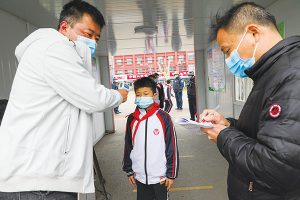China’s strict Covid-zero policy is getting costlier by day. As the infectious omicron variant spreads, the government is resorting to widespread lockdowns. Shanghai, a city of 25 million people, is at a standstill, and cities accounting for a quarter of China’s gross domestic product are under some form of restrictions on movement, estimates Goldman Sachs Group.
Politics is an often-cited reason to explain why China is sticking with Covid-zero. Looking for stability, Beijing is unlikely to relent before this fall’s 20th Party Congress, when President Xi Jinping is expected to start his third term.
Such reasoning, though, is increasingly unpersuasive amid media accounts of unreported deaths in nursing homes and young children separated from their families. Economists are slashing their GDP forecasts, saying the government’s 5.5% target is no longer realistic. Covid-zero has become a destabilising factor.
More likely, China is enforcing a centuries-old social contract: Protecting the elderly at virtually any cost. After all, respect for one’s elders is a cornerstone of Confucian ethics. Of all
the culture’s virtues, filial piety comes first, an ancient saying goes.
As with Hong Kong, which has one of the world’s highest Covid death rates, vast numbers of China’s elderly are not vaccinated. More than 40% of those aged 80 and above had not yet received a single dose as of mid-March. It would take at least three months to get 80% of those aged 60 and above fully jabbed, estimates Morgan Stanley. According to a recent study from Hong Kong University, two doses of Sinovac — while less effective than the treatments approved in the West — can help prevent severe illness.
Unlike the West, which prioritised the elderly in its vaccine rollouts, China started with the working population, which travels more and has wider social circles. At the time, the virus was well-contained in China, and the primary goal was to slow transmission, rather than minimising hospitalisation and deaths.
Later, even when old people became eligible, those with chronic diseases such as diabetes could get medical exemptions too. Beijing did not use its coercive power to impose jabs on those who simply preferred traditional remedies and did not trust Western medicine.
Of course, protecting the unvaccinated elderly comes at great cost, especially to young people who face a much tougher job market in the wake of the government’s big tech crackdowns. In February, the unemployment rate for those aged between 15 and 24 stood at 15.3%, versus the national average of 5.5%. Meanwhile, China is churning out a record 10.8 million college graduates this year, who are now struggling to land good jobs. For much of last year, Xi trumpeted his signature “common prosperity†program, which aimed at broadening the middle class and narrowing wealth gaps.
—Bloomberg
 The Gulf Time Newspaper One of the finest business newspapers in the UAE brought to you by our professional writers and editors.
The Gulf Time Newspaper One of the finest business newspapers in the UAE brought to you by our professional writers and editors.
